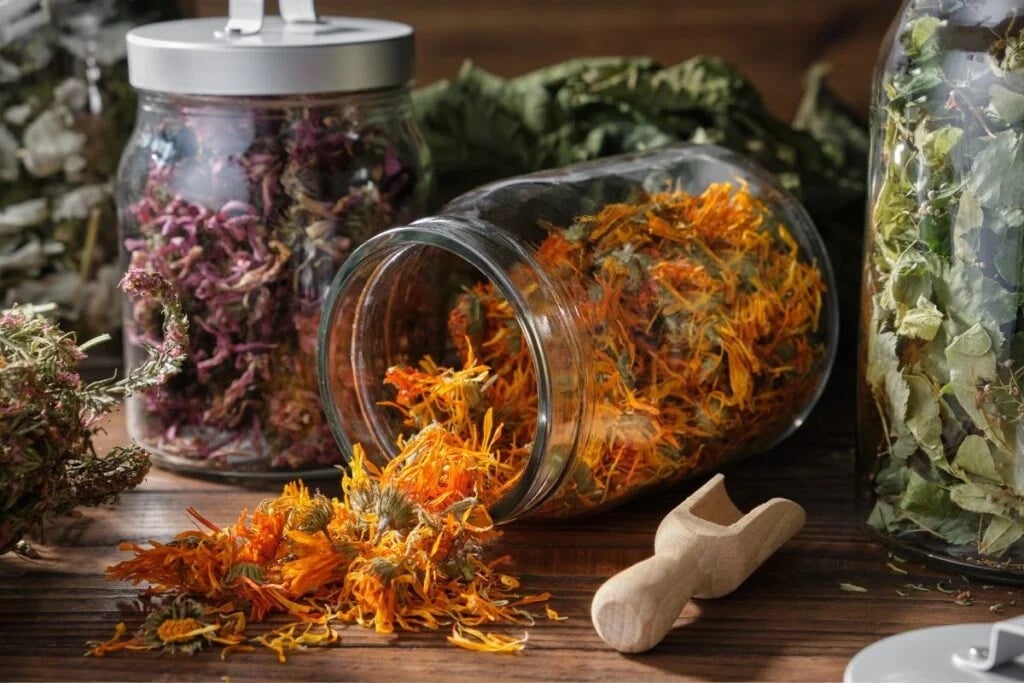St. John’s Wort (Hypericum) is a genus of flowering plants in the Hypericaceae family, comprising around 200 species of perennial herbs and shrubs. For making St. John’s Wort tea and medicinal extracts, people mostly use Hypericum perforatum herb, although H. maculatum shares many of the same therapeutic properties. The main difference lies in the stem—H. maculatum has a four-angled stem, while H. perforatum has a two-angled one, as well as slightly smaller flowers and fewer translucent dots on the leaves. Six species of Hypericum are commonly found in Eastern European countries.
- Hypericum tetrapterum—square-stemmed St. John’s wort, St. Peter’s wort
- Hypericum hirsutum—Hairy St. John’s Wort
- Hypericum humifusum—Trailing St. John’s Wort
- Hypericum maculatum—Spotted or Imperforate St. John’s Wort
- Hypericum montanum—mountain or pale St. John’s wort (protected species)
- Hypericum perforatum—St. John’s Wort
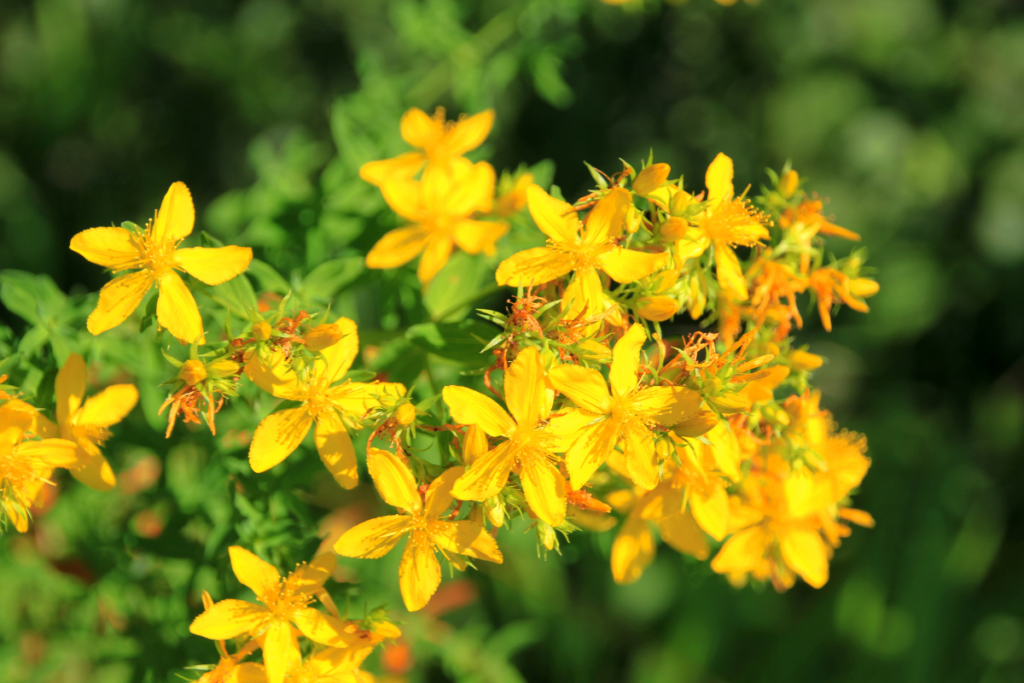
How to Use St. John’s Wort for Tea
St. John’s Wort (Hypericum perforatum) is a perennial herb that grows up to 1 meter tall. It features upright, branching stems; opposite, oval leaves with smooth edges; and clusters of small, bright yellow flowers. The fruit is a capsule. This plant thrives in sunny meadows, along roadsides, and in dry, open forests. It blooms and bears fruit throughout the summer.
For medicinal use—whether in the form of extracts, powders, tablets, or tea—people harvest only the flowering tops and leaves. It is essential to collect them while the plant is in full bloom, as its effectiveness diminishes once it begins to wilt. Look for leaves that appear perforated when held against the light—these are a hallmark of the species. When rubbed between your fingers, they release a reddish juice, similar in color to beetroot.
St. John’s Wort is rich in biologically active compounds, including vitamins C, E, and P, carotenoids, trace minerals, and tannins. You can consume it raw, ground into powder, or brewed into tea. For maximum benefit, the herb is most effective when chewed fresh, taken as a powdered supplement, or added to smoothies. Still, tea remains the most popular method of consumption.
Keep in mind that while the tea is beneficial, its primary active ingredient is not water-soluble, meaning some of its medicinal properties are lost during the brewing process. To get the full benefits, it is recommended to consume both the tea and the steeped plant material.
St. John’s Wort has a mildly bitter taste, but it’s highly supportive of liver health and overall bodily detoxification. It’s also believed to help expel parasites, which can thrive in the body due to excessive sugar consumption.
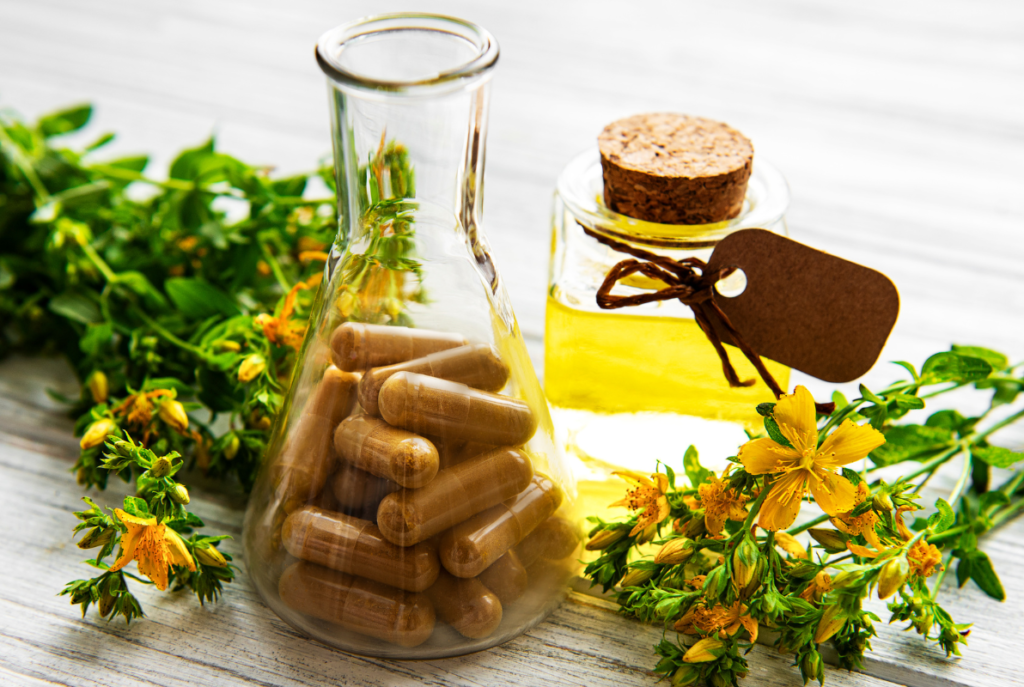
Health Benefits of St. John’s Wort Tea and Herb
St. John’s Wort has been used for centuries in traditional medicine, and people often referred to it as ‘a remedy for 99 ailments.’ While its effects may not be immediate, consistent use over several weeks or months may bring noticeable results. Some of the most well-known St. John’s Wort tea or weed benefits include:
Internal support: Commonly used as a natural anti-inflammatory, antiseptic, and metabolism-regulating remedy. It may help in cases of kidney inflammation, gallstones, respiratory conditions, and digestive issues.
External application: Infusions and compresses made from St. John’s wort are used to treat wounds and promote tissue regeneration. It helps cleanse infected wounds, bruises, burns, ulcers, abscesses, and other skin conditions. It can also be used as a mouth rinse for treating stomatitis.
Mental well-being: St. John’s Wort is perhaps best known for its potential to ease symptoms of mild to moderate depression. It’s widely believed to enhance mood by increasing levels of the neurotransmitters, and one of them is serotonin. The active compounds hypericin and hyperforin play a role in this effect. Many people prefer herbal tea over pharmaceuticals due to the lower risk of side effects.
Anxiety and stress relief: Can be used to reduce anxiety, restlessness, and related breathing difficulties.
Hormonal balance: May help alleviate symptoms of premenstrual syndrome (PMS) and menopause.
Seasonal Affective Disorder (SAD): Especially beneficial during the winter months when exposure to natural light is limited.
Smoking cessation support: May ease withdrawal symptoms and support the process of quitting.
Topical benefits: St. John’s Wort oil is often used to treat hemorrhoids and various skin conditions.
How to Prepare St. John’s Wort Tea
To make a larger batch of tea, place two tablespoons of chopped St. John’s wort into a pot or teapot. Heat until boiling. Once the herbs settle and the liquid changes to a golden-brown hue, strain and serve. Sweeten St. John’s wort tea if desired with sugar, honey, or stevia.
To get the most from this herbal infusion, consider consuming the steeped herbs along with the tea.

St. John’s Wort Tea with Fireweed (Willowherb)
To boost the energizing effects of St. John’s Wort tea, mix it in equal parts with fireweed leaves (Epilobium) before brewing. This combination makes an excellent coffee alternative for your morning routine, offering gentle stimulation and improved alertness. However, it’s best to avoid drinking this blend in the evening, as it may interfere with sleep.
How to Consume St. John’s Wort
If you choose to consume the herb itself (fresh, powdered, or from tea), follow a cycling schedule: take it for 7 consecutive days, then pause for 3 days, repeating as needed. After a month of use, extend the break for several weeks. Adults can consume up to 5 grams per day, with smaller amounts recommended for children.
Chronic or long-standing health concerns may require extended use—sometimes up to a year—always with intermittent breaks. For uninterrupted long-term use, consult with a healthcare provider. Listen to your body and monitor reactions, because each person’s response is unique.
Potential Side Effects and Safety Precautions
Although natural, St. John’s Wort can cause side effects if taken in excessive amounts or without proper guidance. Short-term overuse may lead to:
- Mild digestive upset
- Diarrhea
- Dry mouth
- Headache
- Fatigue or dizziness
- Anxiety or restlessness
- Tingling sensations
- Skin reactions (especially with sun exposure)
- Increased sensitivity to light (photosensitivity)
- Sexual dysfunction or decreased libido
- Vivid dreams
- Liver stress
- In rare cases, psychosis
If you’re taking St. John’s Wort tea or weed regularly or in supplement form, avoid prolonged sun exposure, as the plant may increase sensitivity to UV rays. This reaction is more likely when you consume the herb (either raw, powdered, or in pills) rather than just as tea. Drinking only the St. John’s Wort tea—without consuming the herb itself—generally carries a lower risk of photosensitivity.
Stopping the herb abruptly after prolonged use may lead to mild withdrawal symptoms, including dizziness, nausea, or fatigue, which can last for up to a week.
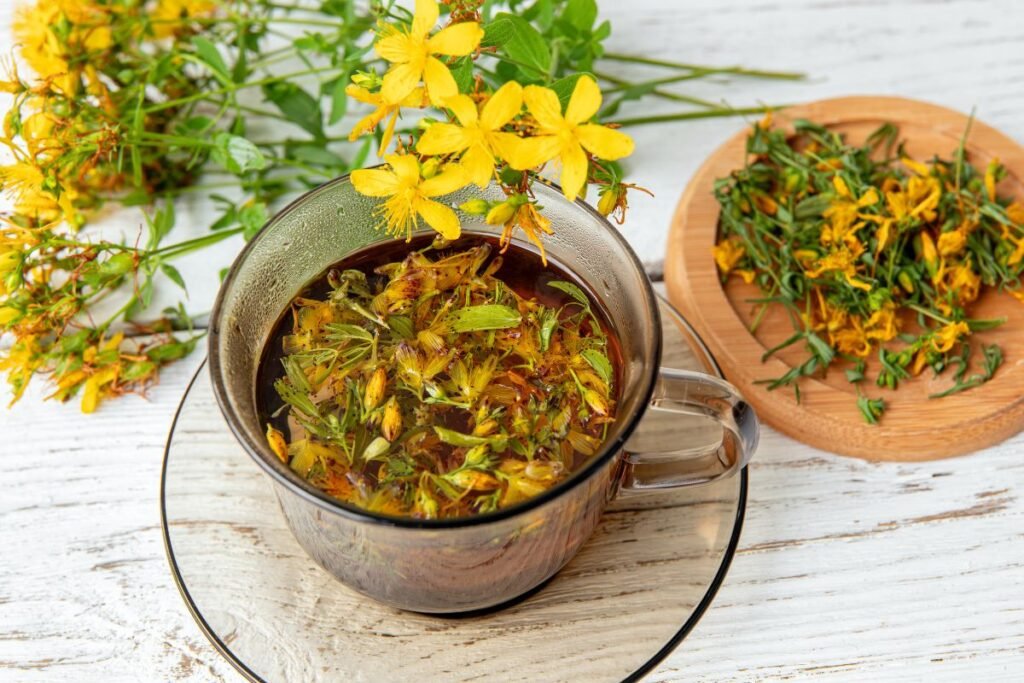
Drug Interactions and Contraindications
This mentioned herb may interfere with the effectiveness of various prescription drugs. These interactions may either reduce the effectiveness of prescription drugs or enhance their effects, leading to potentially dangerous outcomes. Be especially cautious while taking
- Antibiotics
- Antidepressants
- Oral contraceptives
- Blood thinners
- Immunosuppressants
- Anti-anxiety or sedative medications
- Cancer treatments
- HIV medications
- Heart disease drugs
- Over-the-counter cold and flu medications
- Dietary supplements
One of the most serious risks is serotonin syndrome, a potentially life-threatening condition caused by excess serotonin. This can occur if St. John’s Wort tea is combined with SSRIs, SNRIs, or any other serotonin-boosting substance. Symptoms include confusion, fever, hallucinations, nausea, tremors, muscle stiffness, and sweating. If you experience any of these symptoms, stop using the herb immediately and seek medical attention.
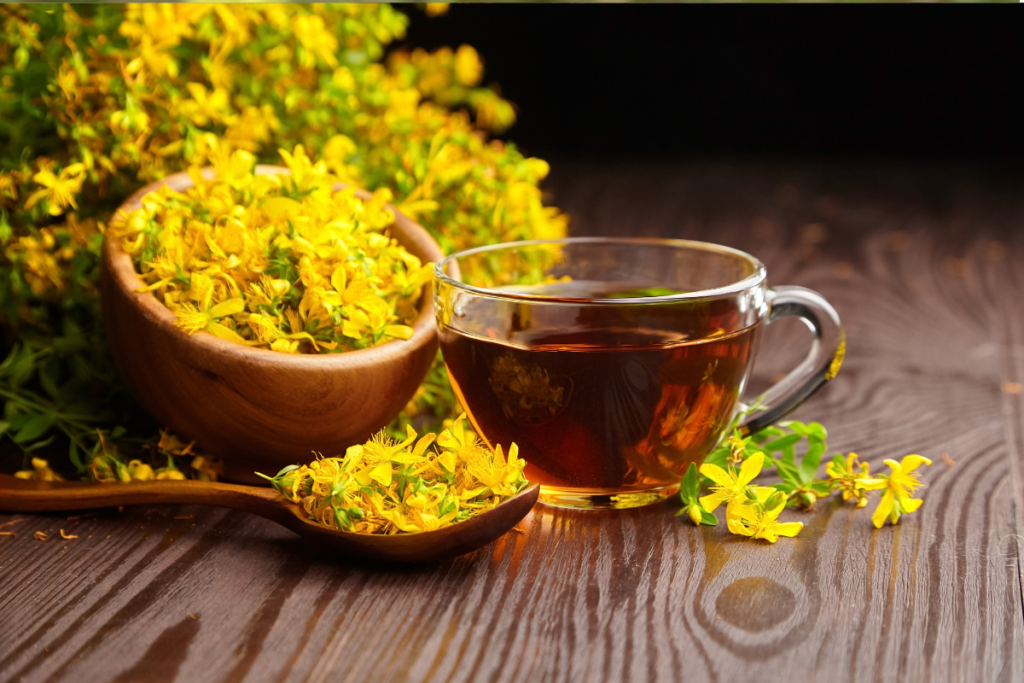
Who Should Avoid St. John’s Wort
People should avoid St. John’s Wort if:
- You are pregnant or breastfeeding.
- You are trying to conceive or using hormonal contraception.
- Have high blood pressure (introduce the herb gradually if used).
- Are scheduled for surgery (stop at least 5 days prior due to anesthesia risks).
- Have had an organ transplant and are taking anti-rejection medication
People with the following conditions should not use St. John’s Wort:
- ADHD
- Bipolar disorder (may trigger mania or rapid cycling)
- Major depression
- Schizophrenia (may increase the risk of psychosis)
- Alzheimer’s disease
If you plan to use St. John’s Wort tea or herb intensively for a specific health issue or begin experiencing side effects, consult a qualified healthcare provider or pharmacist. They can help you assess the potential benefits and risks, as well as how to safely integrate it with your current treatment plan.
Sources:
- https://www.healthline.com/health-news/is-st-johns-wort-safe-080615
- https://www.verywellmind.com/st-johns-wort-a2-89959
- https://www.nccih.nih.gov/health/st-johns-wort
Associative photos ©Canva.

